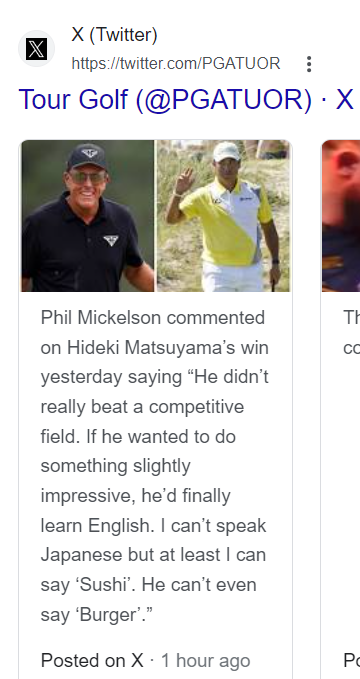In the aftermath of Hideki Matsuyama’s historic victory in the 2024 Genesis invitational, the golfing world was abuzz with celebration and praise for the Japanese champion. However, amidst the chorus of congratulations, one voice stood out for all the wrong reasons. Phil Mickelson’s comment on Matsuyama’s win not only reeked of bias but also displayed a shocking lack of critical thinking.
Mickelson’s remark, “He didn’t really beat a competitive field. If he wanted to do something slightly impressive, he’d finally learn English. I can’t speak Japanese but at least I can say ‘Sushi’. He can’t even say ‘Burger’,” is fraught with prejudice and ignorance on multiple levels.
Dissecting Bias: Unpacking Phil Mickelson’s Controversial Comment on Hideki Matsuyama
Firstly, let’s address the bias inherent in Mickelson’s comment.
By diminishing Matsuyama’s victory as less impressive due to his supposed inability to speak English, Mickelson is perpetuating a narrow-minded view of success. Success in sports, especially golf, should be judged solely on the player’s skill, performance, and sportsmanship, not on their linguistic abilities or cultural background.
Matsuyama’s win was a testament to his years of hard work, dedication, and talent, factors that should be the focus of any discussion surrounding his victory.

Furthermore, Mickelson’s insinuation that Matsuyama’s win was somehow less meaningful because he doesn’t speak English reflects a troubling mindset that undermines the diversity and inclusivity of the sport.
Golf is a global game, with players from all corners of the world competing at the highest level.
To suggest that speaking English is a prerequisite for success in the sport is not only disrespectful but also ignores the countless non-English speaking players who have made significant contributions to the game throughout history.
Lack of Critical Thinking
Additionally, Mickelson’s comment lacks critical thinking and fails to acknowledge the complexities of language acquisition and cultural diversity.
Learning a new language is a challenging endeavor that requires time, effort, and resources. Matsuyama’s priority as a professional golfer is to hone his skills on the course, not to conform to arbitrary expectations regarding his linguistic abilities.
Furthermore, language proficiency should never be used as a measure of one’s worth or achievements.
Instead of applauding Matsuyama’s remarkable accomplishment and celebrating the diversity of talent within the golfing community, Mickelson’s comment only serves to perpetuate harmful stereotypes and divisions.
It is a stark reminder of the importance of confronting bias and promoting inclusivity in sports and society as a whole.
Phil Mickelson’s comment on Hideki Matsuyama’s 2024 Genesis Invitational win exemplifies the dangers of bias and the consequences of lacking critical thinking.
By reducing Matsuyama’s victory to a superficial critique of his language skills, Mickelson not only displays his own ignorance but also undermines the principles of fairness and respect that should define the sporting world.
Moving forward, it is imperative that we challenge such biased narratives and strive to create a more inclusive and equitable environment for all athletes, regardless of their background or abilities.
Then again what can be expected from someone who criticized the Saudis for human rights violations (when America’s human rights record is less-than-stellar) but happily accepts their money?